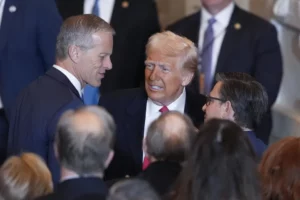
A congressional debate over President Donald Trump’s agenda is being negotiated on the House’s terms after Speaker Mike Johnson (R-LA) won a shock vote Tuesday that quashed Senate hopes of advancing a competing bill.
The Senate is drawing lines in the sand after the House approved a budget framework that would sweep all GOP priorities into “one big, beautiful bill.” Senate GOP leaders want a raft of expiring tax cuts made permanent, something that may not be feasible with the price tag allowed in the House’s resolution.
Major changes to Medicaid will also be a sticking point as House Republicans weigh deep cuts to the entitlement program.
“Will there be changes in the Senate? The short answer is ‘yes,’” said Sen. John Kennedy (R-LA), a member of the Senate Budget Committee. “The long answer is ‘hell yes.’”
The disagreements signal the difficult road ahead for brokering a compromise that can be sent to Trump’s desk. But one dispute put to rest, at least temporarily, is whether to break the agenda into two parts.
As a “Plan B,” Senate Republicans wanted to pass border and defense money in the coming weeks, leaving a fight over tax reform until later in the year. But Johnson’s successful vote Tuesday demonstrated that he can usher unwieldy legislation through his chamber, a prospect many senators considered unlikely given his one-seat majority.
Now, Senate Republicans are seeing if they can craft a new resolution Johnson’s way, with the remaining disagreements focusing on policy rather than strategy. On Tuesday evening, Senate Majority Leader John Thune (R-SD) emphasized that permanency is critical to a final bill that “includes all of the president’s key tax priorities.”
“We’re going to find a way to get both sides of this building on the same page,” said Sen. Steve Daines (R-MT), an adviser to Thune who reiterated the importance of tax permanence in a White House meeting with Trump this week. “It’s going to take some time.”
There were early signs of alignment on Wednesday afternoon after Thune and Johnson met at the White House to discuss a path forward. Johnson has reportedly embraced Thune’s idea of using a “current policy baseline” to score the tax cuts, effectively making them cost-free.
If the Senate parliamentarian rules in Republicans’ favor on that interpretation, it would make navigating tax reform far easier.
Trump has also endorsed making the cuts permanent following the White House meeting with Daines and Senate Finance Committee Chairman Mike Crapo (R-ID).

There are other sticking points that will consume negotiations over the coming weeks, however, among them changes to Medicaid. The House framework instructs the Energy and Commerce Committee to slash $880 billion, which likely means a rollback of the program for low-income households.
“There’s a lot of distance between where the House and the Senate are on this,” Sen. Josh Hawley (R-MO), one of the biggest GOP opponents to slashing benefits, said of the Medicaid dispute.
Trump, for his part, reiterated at his first Cabinet meeting Wednesday that cuts to the program, along with Medicare and Social Security, should be off the table.
“I have said it so many times you shouldn’t be asking me that question,” Trump told reporters. “It won’t be ‘read my lips’ anymore. We’re not going to touch it. Now, we are going to look for fraud. I’m sure you’re OK with that, like people that shouldn’t be on, people that are illegal aliens and other — criminals, in many cases.”
There was little talk about the path forward on budget reconciliation during a closed-door lunch Wednesday between Senate Republicans and White House chief of staff Susie Wiles, according to senators in the room.
House Budget Committee Chairman Jodey Arrington (R-TX) cautioned that straying too far from the House resolution would spoil negotiations and be untenable in his chamber, where members of the Freedom Caucus forced at least $1.5 trillion in total cuts.
“I want to make sure the integrity of our framework, namely, the significant mandatory spending reforms and deficit neutrality, at a minimum, and if those things are intact and we’ve paid for 10 years on any tax provision, then I’m open,” Arrington said. “You got to be able to eat your spinach if you want to get the cream pie.”
TRUMP’S BUDGET CHIEF SHOWS ‘TOTAL’ COMMITMENT TO SHRINKING GOVERNMENT
Some senators remain skeptical of the one-bill approach even after Tuesday’s House vote. Sen. Ron Johnson (R-WI), a fiscal hawk, advocated a three-part plan to address border and defense, tax reform, and spending cuts.
“What’s not going to be possible is one big, beautiful bill right up front. It’s just way too complex,” the Wisconsin senator said. “There’s too many competing interests that’s going to take some time and a lot more effort than what you can expend. No matter how hard you work, you just can’t get it done in a couple weeks or a couple months.”







